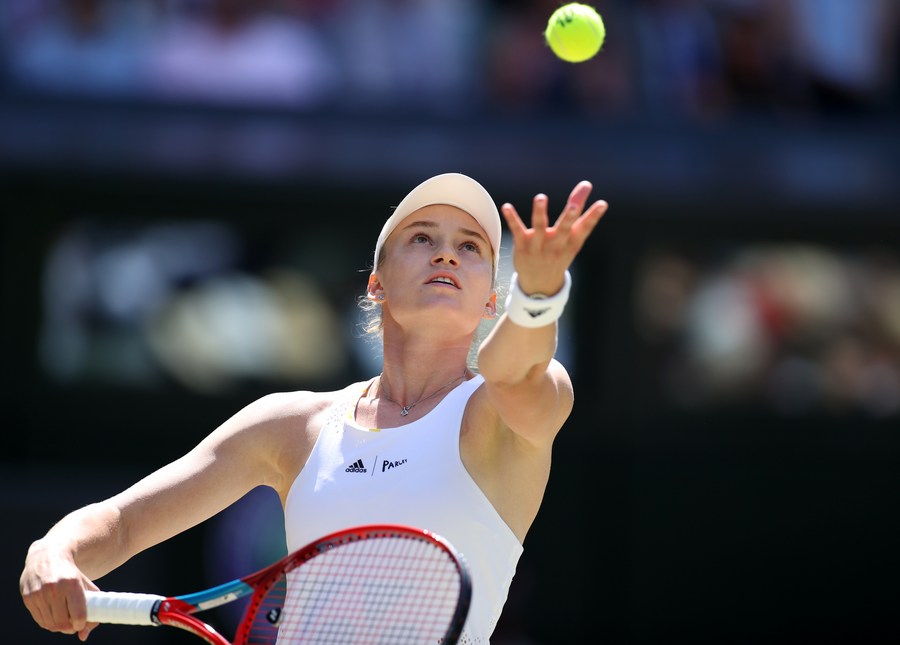By Randy Walker
@TennisPublisher
In the year where Russian and Belarussian players were banned from competing at Wimbledon due to the Ukraine war, a player born, raised and residing in Moscow, Russia, ironically, won the women’s singles title.
Elena Rybakina, a Russian who represents the former Soviet Republic of Kazakhstan, became one of Wimbledon’s most unlikely champions with a 3-6, 6-2, 6-2 win over Ons Jabeur of Tunisia in the women’s singles final. Rybakina started the tournament seeded No. 17, ranked No. 23 and a 100-to-one favorite to win the championship but emerged from chaotic and upset-riddled women’s draw to be, arguably, the most unlikely women’s champion ever at the All England Club. The only lower-ranked women’s champion was Venus Williams, who won the 2007 title while ranked No. 31, but she was already a three-time Wimbledon champion and former world No. 1. Rybakina has only won two WTA titles before her Wimbledon win, had never previously been passed the quarterfinals of a major and only played Wimbledon one previous time. She had shown her potential in beating Serena Williams at the 2021 French Open and finishing in fourth place at the Tokyo Olympics in the summer of 2021.
Rybakina has represented Kazakhstan since 2018, turning to the Central Asian nation located between Russia and China when the Russian Tennis Federation failed to support her. She is the first player to represent Kazakhstan to win a major singles title.
“Many Russians will take glee in the fact that in the year when much was made of the ban of Russian and Belarussian players, someone who was born in Moscow and Russians claim as one their own still (won) even though they didn’t give her the support that she was seeking,” said Chris Fowler on the ESPN television broadcast of the final. “She made a tactical career decision that worked out brilliantly for her.”
Despite the connection with Russia, which has been shunned by most of the world due to their invasion on Ukraine, Rybakina was not treated harshly by fans during her run to the title.
“She was given a very warm treatment by the fans, not just today, but throughout her matches and that wasn’t a given,” said Fowler on ESPN. “It’s a very uneasy, I would say aggressive mutual dislike between the governments of the United Kingdom and Vladimir Putin, but she was not given bad treatment. There wasn’t any indication of that at all.”
Wimbledon, controversially, banned Russian and Belarussian fans from competing at Wimbledon this year, not wanting to award the Russian dictator Putin any propaganda victories. The ATP and WTA Tours, in response to be fair to all players, withdrew ranking points for the event. Winning Wimbledon without ranking points prevents Rybakina from improving her No. 23 ranking. She likely would have cracked the top 10 in the WTA rankings had points been awarded.
Heading into the final, much of the media and fan hype focused on the popular and charismatic Jabeur, the No. 2 seed from Tunisia, who was seeking to become the first Arab woman to win a major tournament. While many predicted a Jabeur victory that would catapult even more interest in tennis in the Arab world, especially among women, it was the shy and reserved Rybakina who ended up being the trailblazing champion as the first major singles winner for her country.
“Everybody knows Ons’ story and everybody respects what she’s doing for the Arab world and African world and that she’s become sort of the spearhead for giving girls more opportunities in that part of the world,” said former Wimbledon champion Chris Evert on ESPN. “But nobody really knows (Elena’s) story as much. She hasn’t been on the center stage. She hasn’t been on TV a lot. She hasn’t been written a lot about a lot and she’s so quiet and introverted that we don’t really know her personality, but we’re going get to know her personality, because she’s going be doing a lot of press and she’s going be out there for the world to see. And, she’s going to come out of her shell.”
Rybakina was almost emotionless when she clinched the title, Pam Shriver on ESPN calling it “the most subdued reaction in the history of Wimbledon” as she compared it to winning a first round match at the Wimbledon warm-up event in Birmingham, England.
Jabeur seemed poised to secure her spot in history by winning four straight games to take 4-1 lead in the first set before closing it out 6-3. However, Rybakina began to connect with her powerful first serve and groundstrokes to mostly dominant the final two sets. The turning point in the match came with Rybakina serving up a service break at 3-2 in the second set, but faced a 0-40 deficit. She was able to fight herself out of the deficit to hold serve for a 4-2 lead but breaking Jabeur again the next game and then serving out the match. “She just put her head down and went to work,” said Evert of the hold from 0-40 down. Said Fowler, “She may remember that escape the rest of her life.”
Rybakina became the first player to lose the first set in a Wimbledon final and go on to win in 15 years. It marked the sixth straight year in the women’s draw that the champion was a first time Wimbledon winner. The Rybakina vs. Jabeur final marked the first time that two first-time major finalists met for the title at the All England Club since 1962, when Karen Hantze Susman defeated Vera Sukova 6-4, 6-4

